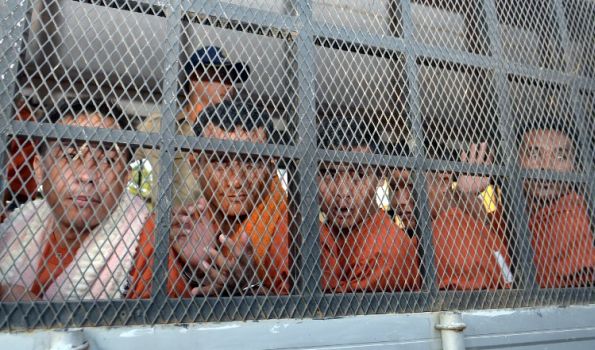Labour activism in Cambodia
Released, but hardly free

THE government of Cambodia’s eternal prime minister,
Hun Sen, has been waging an assault on public dissent since January 3rd.
That was the day Cambodian security forces in the capital shot dead
four garment workers who had been striking over the minimum wage.
Mr
Hun Sen’s Cambodian People’s Party (CPP) has placed bans on public
gatherings, driven opposition supporters from the (unfortunately named)
Freedom Park, and deployed baton-wielding thugs to beat protesters and
detain union leaders.
Advertisement
At
the same time, the single-party National Assembly has passed three
controversial laws in double-time, each of which will affect the
functioning of the judiciary. The main opposition, Sam Rainsy’s Cambodia
National Rescue Party, might have acted to slow down the government
with its 55 seats, but they have been busy boycotting parliament in
protest against last July’s election result. The new laws are expected
to strengthen the CPP’s grip on the court system. Not that it needs much
strengthening; the party is routinely accused of wielding the courts as
a weapon against its opponents.
Its power was on display
again on Friday, May 30th, even as one court brought relief to 23
men—all of them union leaders, activists or workers—who had been dragged
away during January’s bloody clashes. They had been arrested and 21 of
them had been detained since January, to be charged with intentional
violence and incitement. They were finally released, on the court’s
order, nearly six months after they were taken in, to the cheers of
their families and other supporters. The judgment came as bittersweet
however; in the eyes of the court, all of them are held guilty. Each of
them was handed a suspended prison sentence, some as long as four and
half years.
“We are relieved by the decision [to release them],” read a statement published by a coalition of more than 100 NGOs. “However, we deeply regret they were released following suspended sentences, some of them having to pay heavy fines, at the conclusion of an extremely flawed trial process.”
The suspicion is that
the government orchestrated their trials in order to detract attention
from its own role in the deadly clashes. But government spokesman Phay
Siphan has insisted in local media that the courts are independent. He
says it is “not for a party to make legal decisions”.
The
government’s critics complain that the prosecution had lacked credible
evidence. The cases mirrored other recent cases against high-profile
agitators, which have played out the same way. A radio director, Mam
Sonando, and a group of land-rights activists known as “the Boeung Kak
13” are among those who have been imprisoned over the past two years. In
those cases too, the convicted protesters were released on suspended
sentences after raising an international outcry.
“From
the government’s perspective, each of these cases involves an ongoing
calculation—how to intimidate groups so that they don't protest or act
against the government again…While at the same time [the Cambodian
government is] trying to keep links to donor governments that [it] needs
to fund many of their projects and activities,” says Phil Robertson,
deputy director of Human Rights Watch’s Asia division.
This
suggests an important role for international activism, even when it is
motivated by commercial interests. In the case of the 23 detainees, it
was hard to miss the statements from the international clothing brands
that support Cambodia’sbiggest export industry. Before the verdict was
announced they could be heard warning the government that “instability”
could hurt its billion-dollar industry.
Mr Robertson is
concerned that with the passage of the three judicial laws, the
government’s influence on the court “will go from bad to worse”. But
others are more concerned about a proposed law that would further limit
trade unions’ freedom to organise. For a start, only a single union
would be allowed to operate in any given workplace.
A
representative of the International Labour Organisation (ILO) criticised
Cambodia’s labour ministry at a forum in Phnom Penh in May. He faulted
the ministry for failing to tend to gaps in the law and for presenting
draft legislation that would violate the ILO’s conventions on collective
bargaining. To adopt the draft as a law, he said, would be a step
backwards.
It is a step that looks likely to be taken
very soon. It is easy enough for a government to step in any direction
it likes, when parliament is in effect just one party.
(Picture credit: AFP)


No comments:
Post a Comment